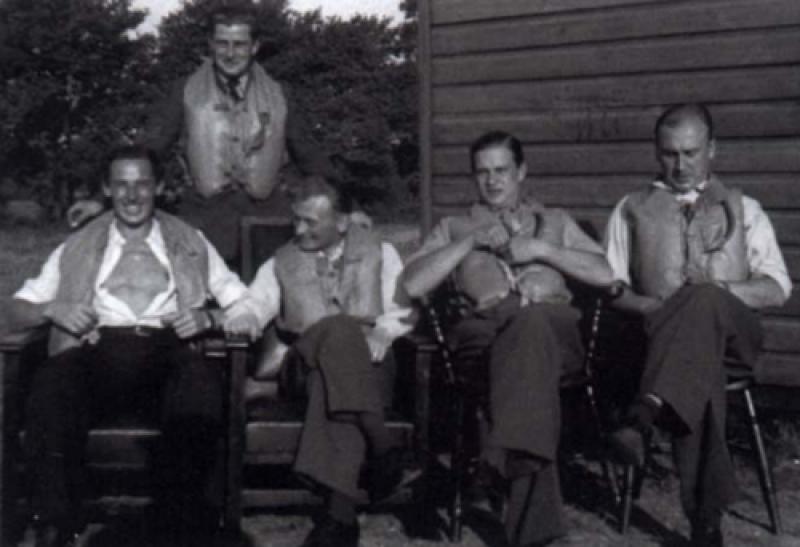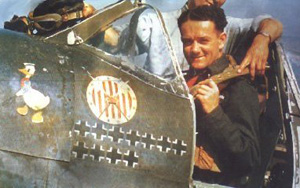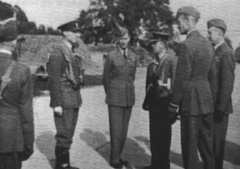Bloody Foreigners: The Untold Battle of Britain, Channel 4 | reviews, news & interviews
Bloody Foreigners: The Untold Battle of Britain, Channel 4
Bloody Foreigners: The Untold Battle of Britain, Channel 4
Bittersweet saga of the RAF's heroic Polish pilots

The part played by Polish fighter pilots during the Battle of Britain has hardly gone undocumented, and the Hun-zapping exploits of the Polish 303 Squadron will be familiar to anyone with a historical interest in the subject, so you’d have to say that calling this film The Untold Battle of Britain was a wee bit of an exaggeration.
Those sequences didn’t reappear in The Untold…, though several other dollops of the movie did, featuring Spitfires, Hurricanes, Heinkels and those famously not-quite-right-looking Messerschmitt 109s. Slightly questionable, surely, to shove uncredited lumps of a fictional (albeit factually based) movie into a supposedly historical story, though I suppose it’s a measure of the way the movie has been absorbed into our Island Story and granted a kind of honorary degree in authenticity.
 Anyway, as the nation celebrates the 70th anniversary of the Battle of Britain this summer, who could deny that the story of the heroic Polish pilots deserves wider exposure? With poignant timing, 303 squadron became fully operational on 31 August, 1940 - the first anniversary of the German invasion of Poland. Having been shredded by the superior machinery of the Luftwaffe over their home turf, many of the Polish pilots had then fought in France as the Blitzkrieg thundered towards the English Channel (picture above right: Lt Jan Zumbach of 303 Squadron). That didn’t go too well either, but finally the Battle of Britain offered them the chance to hit back at Jerry on more equal terms. Even though they were equipped with Hurricanes rather than the more glamorous but less numerous Spitfires, they tore into the huge German formations with malice palpably aforethought, almost welcoming the Germans’ numerical superiority because it gave them more targets to shoot at. Where home-grown pilots might start firing at the enemy when they were 400 yards away, the Poles reckoned 100 yards was about right – if you got that close, your quarry became quite difficult to miss. As British pilot Billy Drake commented, while the Brits merely wanted to shoot down the German aircraft, “the Poles wanted to kill anybody that was in those aeroplanes.”
Anyway, as the nation celebrates the 70th anniversary of the Battle of Britain this summer, who could deny that the story of the heroic Polish pilots deserves wider exposure? With poignant timing, 303 squadron became fully operational on 31 August, 1940 - the first anniversary of the German invasion of Poland. Having been shredded by the superior machinery of the Luftwaffe over their home turf, many of the Polish pilots had then fought in France as the Blitzkrieg thundered towards the English Channel (picture above right: Lt Jan Zumbach of 303 Squadron). That didn’t go too well either, but finally the Battle of Britain offered them the chance to hit back at Jerry on more equal terms. Even though they were equipped with Hurricanes rather than the more glamorous but less numerous Spitfires, they tore into the huge German formations with malice palpably aforethought, almost welcoming the Germans’ numerical superiority because it gave them more targets to shoot at. Where home-grown pilots might start firing at the enemy when they were 400 yards away, the Poles reckoned 100 yards was about right – if you got that close, your quarry became quite difficult to miss. As British pilot Billy Drake commented, while the Brits merely wanted to shoot down the German aircraft, “the Poles wanted to kill anybody that was in those aeroplanes.”
They achieved this with merciless efficiency. Historians and statisticians have made subsequent revisions of the numbers, but according to the programme, it took less than a month for 303 Squadron to record its 100th “kill”. The squadron shot down six German aircraft on its first official combat sortie, and on 7 September 1940, 303 shot down 16 planes in less than 15 minutes. Józef František, a Czech pilot flying with the Poles, was credited with 17 kills and was the highest-scoring Allied ace in the Battle of Britain.
 The English girls loved the Poles, the newspapers raved about their exploits, and King George VI visited them at their Northolt base and signed his name in the squadron diary (the royal visit, pictured left). But this programme was part of a series called Bloody Foreigners, and there was a bitter sting to the tale. The Polish flyers thought they were fighting for their own post-war freedom, only to find that the Western allies had sold them out to Stalin at the Yalta conference. Pilots who returned home were liquidated by Poland’s new Communist administration. When the British held a huge multi-nation victory parade in London in 1946, the Poles weren’t invited because apparently our government was afraid of upsetting Stalin. “We watch with sorrow the strange outcome of our endeavours,” said Winston Churchill. “Strange” doesn’t seem quite adequate, somehow.
The English girls loved the Poles, the newspapers raved about their exploits, and King George VI visited them at their Northolt base and signed his name in the squadron diary (the royal visit, pictured left). But this programme was part of a series called Bloody Foreigners, and there was a bitter sting to the tale. The Polish flyers thought they were fighting for their own post-war freedom, only to find that the Western allies had sold them out to Stalin at the Yalta conference. Pilots who returned home were liquidated by Poland’s new Communist administration. When the British held a huge multi-nation victory parade in London in 1946, the Poles weren’t invited because apparently our government was afraid of upsetting Stalin. “We watch with sorrow the strange outcome of our endeavours,” said Winston Churchill. “Strange” doesn’t seem quite adequate, somehow.
The future of Arts Journalism
You can stop theartsdesk.com closing!
We urgently need financing to survive. Our fundraising drive has thus far raised £49,000 but we need to reach £100,000 or we will be forced to close. Please contribute here: https://gofund.me/c3f6033d
And if you can forward this information to anyone who might assist, we’d be grateful.

Subscribe to theartsdesk.com
Thank you for continuing to read our work on theartsdesk.com. For unlimited access to every article in its entirety, including our archive of more than 15,000 pieces, we're asking for £5 per month or £40 per year. We feel it's a very good deal, and hope you do too.
To take a subscription now simply click here.
And if you're looking for that extra gift for a friend or family member, why not treat them to a theartsdesk.com gift subscription?
more TV
 Black Rabbit, Netflix review - grime and punishment in New York City
Jude Law and Jason Bateman tread the thin line between love and hate
Black Rabbit, Netflix review - grime and punishment in New York City
Jude Law and Jason Bateman tread the thin line between love and hate
 The Hack, ITV review - plodding anatomy of twin UK scandals
Jack Thorne's skill can't disguise the bagginess of his double-headed material
The Hack, ITV review - plodding anatomy of twin UK scandals
Jack Thorne's skill can't disguise the bagginess of his double-headed material
 Slow Horses, Series 5, Apple TV+ review - terror, trauma and impeccable comic timing
Jackson Lamb's band of MI5 misfits continues to fascinate and amuse
Slow Horses, Series 5, Apple TV+ review - terror, trauma and impeccable comic timing
Jackson Lamb's band of MI5 misfits continues to fascinate and amuse
 Coldwater, ITV1 review - horror and black comedy in the Highlands
Superb cast lights up David Ireland's cunning thriller
Coldwater, ITV1 review - horror and black comedy in the Highlands
Superb cast lights up David Ireland's cunning thriller
 Blu-ray: The Sweeney - Series One
Influential and entertaining 1970s police drama, handsomely restored
Blu-ray: The Sweeney - Series One
Influential and entertaining 1970s police drama, handsomely restored
 I Fought the Law, ITVX review - how an 800-year-old law was challenged and changed
Sheridan Smith's raw performance dominates ITV's new docudrama about injustice
I Fought the Law, ITVX review - how an 800-year-old law was challenged and changed
Sheridan Smith's raw performance dominates ITV's new docudrama about injustice
 The Paper, Sky Max review - a spinoff of the US Office worth waiting 20 years for
Perfectly judged recycling of the original's key elements, with a star turn at its heart
The Paper, Sky Max review - a spinoff of the US Office worth waiting 20 years for
Perfectly judged recycling of the original's key elements, with a star turn at its heart
 The Guest, BBC One review - be careful what you wish for
A terrific Eve Myles stars in addictive Welsh mystery
The Guest, BBC One review - be careful what you wish for
A terrific Eve Myles stars in addictive Welsh mystery
 theartsdesk Q&A: Suranne Jones on 'Hostage', power pants and politics
The star and producer talks about taking on the role of Prime Minister, wearing high heels and living in the public eye
theartsdesk Q&A: Suranne Jones on 'Hostage', power pants and politics
The star and producer talks about taking on the role of Prime Minister, wearing high heels and living in the public eye
 King & Conqueror, BBC One review - not many kicks in 1066
Turgid medieval drama leaves viewers in the dark
King & Conqueror, BBC One review - not many kicks in 1066
Turgid medieval drama leaves viewers in the dark
 Hostage, Netflix review - entente not-too-cordiale
Suranne Jones and Julie Delpy cross swords in confused political drama
Hostage, Netflix review - entente not-too-cordiale
Suranne Jones and Julie Delpy cross swords in confused political drama
 In Flight, Channel 4 review - drugs, thugs and Bulgarian gangsters
Katherine Kelly's flight attendant is battling a sea of troubles
In Flight, Channel 4 review - drugs, thugs and Bulgarian gangsters
Katherine Kelly's flight attendant is battling a sea of troubles

Add comment